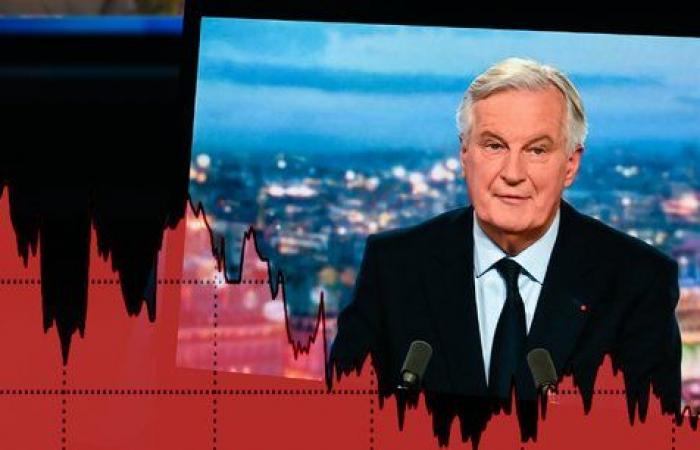Who did the Prime Minister, Michel Barnier, want to scare during his televised intervention on Tuesday evening? His message was undoubtedly addressed to the unobtainable majority of Parliament, but it was mainly heard on the financial markets. “There will be a probably quite serious storm and turbulence in the financial markets”he warned in the event of an institutional blockage on the budget.
When the markets opened this Wednesday, the risk premium for ten-year French debt (yield gap between the French OAT and the German Bund) soared to close to 90 basis points, a level not reached since mid-2012.
Even the announcement of the dissolution by President Emmanuel Macron last June did not bring the French “spread” to such high levels.
Certainly, this risk premium is still far from the 190 basis points during the peak of market stress of the euro crisis in November 2011. But such an upward movement on a sovereign debt as deep and liquid as that of the France, rated AA-/Aa3 (i.e. among the best European signatures) is rare. The fever also quickly dropped to around 86 points. This remains a high level, whereas this yield gap was around 60 basis points at the start of the year. In any case, higher than the risk premium of Spain or Portugal.
Towards a spread at 100 basis points?
However, Michel Barnier did not play the firefighter-arsonist. He only warned of a sharp deterioration in this risk premium in recent days, as the parliamentary debates on the budget dragged on and, above all, as the first threats of censorship of the government emanating from the National Rally (RN) showed up. However, this risk premium has become, in recent months, a closely followed indicator… by the political class. In less than two weeks, the spread rose from 70 basis points to 80 basis points, a level not seen since June.
“Market participants like round numbers and therefore the next target is clearly 100 basis points”jokes a rates manager.
“At 88 basis points, it is no longer the calm sea of 20 to 40 basis points that we experienced between 2015 and 2020, but it is not yet the storm like in 2011 and 2012. But the “momentum” is not favorable and the risk is to see the market go for 100 basis points »confirms Alexandre Baradez, head of market analysis at IG.
Franco-French stress
So don't panic on the markets, far from it. There are some restoring forces. First of all, the European Commission validated France's budgetary trajectory. Which was not necessarily won. Then, only the spread OAT/Bund finally stepped aside. The Italian BTP/Bund spread not only has not changed but it remains at the lowest levels since the end of 2021 (around 125 basis points). However, Italy is indeed the country to watch when there is a risk on sovereign debt in the euro zone. So the shock on the markets is indeed Franco-French.
“It's too bad for France which cannot offer anything reassuring, but the good news, on a European scale, is that unlike the 2011 crisis, there is no contagion »observes Alexandre Baradez.
Finally, this market stress comes at a time when European long-term rates are on a downward slope since the election of Donald Trump, against a backdrop of fears of a trade war between the United States and the European Union. As a result, the OAT rate – that actually paid by the State – has plunged since November 5 from 3.15% to 3.02% today! Simply, the Bund fell faster than the OAT!
Arms vigil
A major (and lasting) political crisis would nevertheless have a negative effect on French debt beyond the risk premium. The timing is not very good as the rating agency S&P Global must rule on the quality of French debt (AA-, stable) on Friday as part of its biannual review. Even if the market has already anticipated a drop of one to two notches in France's credit rating.
But above all, the Treasury must present its issuance program for the year 2025, i.e. some 300 billion euros, to investors at the beginning of December.
“The month of January is also likely to be a little complicated with the reopening of broadcast programs. This will then be a key test for the Treasury”warns Matthieu de Clermont, investment director at Allianz Global Investors.
During the summer, there was already a point of tension when non-resident investors, particularly Japanese, were net sellers of French debt. A non-voted budget would then have a worse effect on non-residents who are the main buyers of French debt, well ahead of French banks. Already, according to Geoff Yu, strategist at BNY, notes in a note that “this week was the worst for French debt in two years, with the French OAT facing the most concentrated period of net sales since the peak of the European energy crisis at the end of 2022”.






